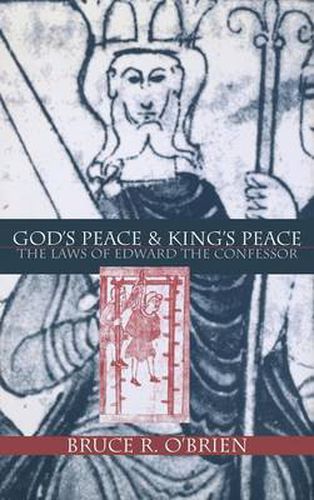Readings Newsletter
Become a Readings Member to make your shopping experience even easier.
Sign in or sign up for free!
You’re not far away from qualifying for FREE standard shipping within Australia
You’ve qualified for FREE standard shipping within Australia
The cart is loading…






Sometime before the middle of the twelfth century, an anonymous English writer composed the Leges Edwardi, a treatise purporting to contain the laws that had been in force under the Anglo-Saxon King Edward the Confessor (1042-1066), cousin of William the Conqueror. The laws were said to have been spoken to William shortly after the Conquest by English nobles who were wise men and learned in their law, recounting the rules of their laws and customs for the invading Norman king. When they had finished, the king wondered whether it might not be better for all of them to live under the law of his Viking ancestors; the English, however, protested that they preferred to live by their own preconquest laws. The king acquiesced, and thus, goes the story, were the laws of King Edward the Confessor authorized.
Looking through the lens of this important-if spurious-treatise, God’s Peace and King’s Peace offers the first ground-level view of English law during the century in which the common law was born. Bruce R. O'Brien compares the Leges Edwardi to other memorials of legal policy and practice from before and after 1066, in both Normandy and England, and advances conclusions about the treatises’ reliability on specific points of law. He also shows how the Laws of Edward the Confessor, taken as a record of English law at the conquest, came to be used as authoritative evidence behind the Magna Carta that the king was under the law, and how it was eventually declared a notorious forgery by seventeenth-century antiquaries and Enlightenment historians.
$9.00 standard shipping within Australia
FREE standard shipping within Australia for orders over $100.00
Express & International shipping calculated at checkout
Sometime before the middle of the twelfth century, an anonymous English writer composed the Leges Edwardi, a treatise purporting to contain the laws that had been in force under the Anglo-Saxon King Edward the Confessor (1042-1066), cousin of William the Conqueror. The laws were said to have been spoken to William shortly after the Conquest by English nobles who were wise men and learned in their law, recounting the rules of their laws and customs for the invading Norman king. When they had finished, the king wondered whether it might not be better for all of them to live under the law of his Viking ancestors; the English, however, protested that they preferred to live by their own preconquest laws. The king acquiesced, and thus, goes the story, were the laws of King Edward the Confessor authorized.
Looking through the lens of this important-if spurious-treatise, God’s Peace and King’s Peace offers the first ground-level view of English law during the century in which the common law was born. Bruce R. O'Brien compares the Leges Edwardi to other memorials of legal policy and practice from before and after 1066, in both Normandy and England, and advances conclusions about the treatises’ reliability on specific points of law. He also shows how the Laws of Edward the Confessor, taken as a record of English law at the conquest, came to be used as authoritative evidence behind the Magna Carta that the king was under the law, and how it was eventually declared a notorious forgery by seventeenth-century antiquaries and Enlightenment historians.